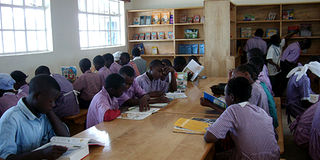WB bans publisher from Kenya’s free learning scheme

Photo/FILE
Last year, Kenya’s ministry of Education officials were accused of misappropriating funds allocated to the Free Primary and Free Secondary Education programme.
A UK-based publishing firm has been banned by the World Bank from supplying learning materials to public schools in Kenya.
This, the Bank says, is on the basis of bribing government officials in the award of tenders under the Bank-funded projects, thus violating its integrity code on contractors and service providers.
The three-year ban will also be effected in Tanzania, where the publisher is also accused of instituting similar tactics to win tenders.
Oxford University Press has admitted that officials in its subsidiaries — the Oxford University Press East Africa Ltd based in Kenya and the Oxford University Press Tanzania Ltd — bribed government officials to secure contracts to supply text books under the free basic education over 2007 to 2010.
The projects were partly funded by the World Bank.
“This debarment is testimony to the Bank’s continued commitment to protecting the integrity of its projects,” World Bank Integrity Vice President Leonard McCarthy said in a statement.
Oxford will also pay Sh42 million ($500,000) to the World Bank in what the two institutions say is part of a negotiated resolution.
Last year, Kenya’s ministry of Education officials were accused of misappropriating funds allocated to the Free Primary and Free Secondary Education programme.
A report tabled in Parliament last year indicated that the officials had looted Sh4.6 billion meant for FPE and FDSE.
Part of the money lost through corruption was donors’ contribution, who threatened to withdraw their support.
According to the Oxford University Press chief executive, Mr Nigel Portwood, the admission came after a report by its external lawyers and forensic accountants retained to undertake investigation on the two subsidiaries.
“We are absolutely committed to the highest standards of integrity throughout OUP, and are redoubling our efforts to secure that commitment,” Mr Portwood said in a statement.
In 2010, the World Bank Group debarred Macmillan for six years for bribery linked to an education project in Sudan.
Based on a World Bank Integrity Vice Presidency referral, UK authorities ordered Macmillan Publishers Ltd to pay over Sh1.441 billion (£11 million).
The chairperson of the Kenya Publishers Association, Mr Lawrence Njagi, termed the revelation as unfortunate given the international profile of Oxford University Press.
“It is sad that a company with international reputation can be involved in such malpractice. That could have been the reason why local publishers have found it very difficult to win some tenders. Publishers are supposed to compete for such tenders openly,” Mr Njagi told Nation on phone.
He said it’s still very early to determine which action KPA would take against the publisher, adding that they would try to establish the extent to which the local office was involved in the malpractice before deciding on the action to take.
“KPA will hold a governing council meeting next week to discuss what action to take,” Mr Njagi noted.




